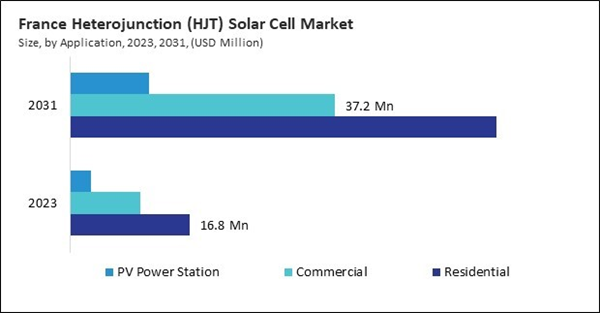The Germany market dominated the Europe Heterojunction (HJT) Solar Cell Market by Country in 2023, and is forecast to continue being a dominant market till 2031; thereby, achieving a market value of $173.8 Million by 2031. The UK market is exhibiting a CAGR of 15.4% during (2024 - 2031). Additionally, The France market is projected to experience a CAGR of 17.8% during (2024 - 2031).
The market for heterojunction (HJT) solar cells is poised at a critical juncture in the renewable energy landscape, which is marked by rapid technological advancements and increasing environmental awareness. As the demand for cleaner energy sources escalates, solar power continues to gain prominence, fueled by its potential to provide sustainable, low-carbon energy.
HJT technology combines the benefits of crystalline silicon solar cells with those of thin-film technologies, enabling it to achieve higher efficiencies and superior performance under different environmental conditions. The efficiency of the cell's conversion of sunlight into electricity is improved by the reduction of electron recombination in this configuration. The technology's dual nature improves its efficiency and adaptability to varying temperatures, making HJT solar cells particularly effective in regions with high ambient temperatures.
Spain is leading the energy transition as a result of its energy and climate change policies. The framework for energy and climate in Spain is now based on the 2050 goals of achieving national climate neutrality, incorporating renewable energy into the electricity mix at a rate of one hundred percent, and incorporating renewable energy into the entire energy mix at a rate of nine, seven percent. This is due to the fact that it is focused on the significant advancement of renewable energy, particularly solar.
The Spanish government offers various programs to support innovation in the renewable energy sector. The Centre for Industrial Technological Development (CDTI) provides grants and funding for R&D projects. This government support can accelerate the adoption of HJT technology through advancements in domestic manufacturing. Thus, these dynamics show a clear trend toward increasing adoption of HJT solar technology in Europe.
List of Key Companies Profiled
- Reliance Industries Limited (REC Solar Pte. Ltd.)
- Jinneng Clean Energy Technology Ltd. (Jinneng Holding Group)
- Anhui Huasun Energy Co., Ltd.
- Jiangsu Akcome Science and Technology Co., Ltd.
- CANADIAN SOLAR INC.
- RISEN ENERGY Co., LTD.
- Enel S.p.A
- Meyer Burger Technology AG
Market Report Segmentation
By Type- Bifacial Cell
- Monofacial Cell
- Residential
- Commercial
- PV Power Station
<
- Germany
- UK
- France
- Russia
- Netherlands
- Italy
- Rest of Europe
Table of Contents
Companies Mentioned
- Reliance Industries Limited (REC Solar Pte. Ltd.)
- Jinneng Clean Energy Technology Ltd. (Jinneng Holding Group)
- Anhui Huasun Energy Co., Ltd.
- Jiangsu Akcome Science and Technology Co., Ltd.
- CANADIAN SOLAR INC.
- RISEN ENERGY Co., LTD.
- Enel S.p.A
- Meyer Burger Technology AG









